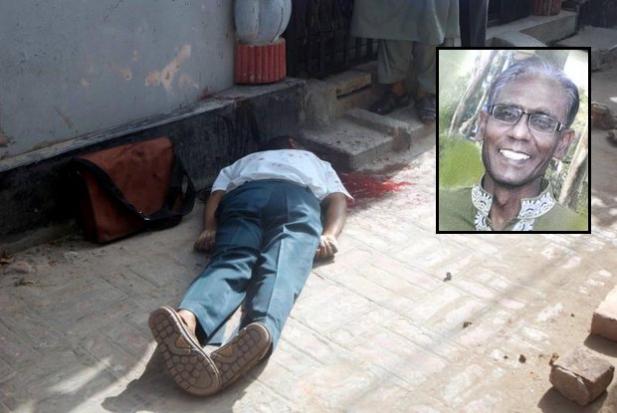DHAKA – A college professor was hacked to loss of life using attackers armed with machetes in northwestern Bangladesh on Saturday, a killing claimed by Islamic Kingdom jihadists and echoing the murders of numerous secular bloggers.
The assailants nearly beheaded English professor Rezaul Karim Siddique, fifty-eight, after they attacked him from in the back as he walked to the bus station from his domestic inside the metropolis of Rajshahi, police stated.
“Through analyzing the character of the assault, we suspect that it becomes finished by using extremist businesses,” said Rajshahi Metropolitan Police Commissioner Mohammad Shamsuddin.
The Islamic country (IS) institution claimed that Siddique, the fourth professor from Rajshahi College, was killed by Islamists.
Militants have additionally centered secular bloggers and college students in a string of murders that has sparked outrage and raised fears freedom of speech is below risk in Muslim-majority Bangladesh.
“Islamic country warring parties assassinate(d) a university instructor for calling to atheism inside the city of Rajshahi in Bangladesh,” IS’s Amaq news enterprise said.
READ MORE :
- Blogger Clayton Kelly goes free
- Bangladesh Blogger Seeks US Help as Threats Escalate
- Remain Safe on the Internet With These 7 Tips
- 8 Online Security Tips for Startups
- ISA vows to lower finance cost, talks of $1 trn investment
Shamsuddin said police had not yet named any suspects; however, the sample of the assault geared up with preceding killings by Islamist militants.
Human beings near Siddique stated he had never spoken out in opposition to religion. Still, he may additionally have been focused on his role in main tune and literature organizations.
“As some distance as I recognize, my husband didn’t have any private enmity with everyone,” his wife, Hosne Ara, instructed the BBC.
Hundreds of college students held protests after news of the murder, marching on the campus and shouting slogans annoying the arrest of the attackers, stated nearby police leader Humayun Kabir.
“The scholars had been shocked by the contemporary brutal killing of their teachers,” said Mostafiz Mishu, a scholar who witnessed the protests.
“Some 500 of them shouted slogans and joined the marches calling for the safety of all instructors and exemplary punishment for the killers.”
Homegrown Islamist militants were blamed for killing numerous secular bloggers and online activists in 2013, most recently within the capital, Dhaka, early this month.
Eight members of the banned Islamist organization Ansarullah Bangla crew, which includes a pinnacle cleric stated to be its founder, had been convicted over the last 12 months for the murder of atheist blogger Ahmed Rajib Haider.
Sakhawat Hossain, a friend and colleague of Siddique at the university, stated he used to play the tanpura, a musical device famous in South Asia, and wrote poems and quick testimonies.

“He used to guide a cultural organization called Komal Gandhar and edit a bi-annual literary mag with the identical name. But he by no means wrote or spoke towards religion in public,” Hossain said.
Nahid Islam, a deputy commissioner of police, stated Siddique become worried about numerous cultural programs and had installed a tune faculty at Bagmara, a former bastion of an outlawed Islamist group Jamayetul Mujahideen Bangladesh.
“The assault is similar to those completed on (atheist) bloggers in the latest past,” Islam said, including no person had been arrested.
Champa Patel, Amnesty International’s South Asia director, condemned the brand new killing as “inexcusable,” announcing it was part of a “gruesome sample.”
“The government should do greater to place an end to these killings. Now, not a single man or woman has been brought to justice for the assaults over the last year,” Patel said.
A long-jogging political crisis in Bangladesh, which is majority Sunni Muslim but officially secular, has radicalized warring parties of the authorities, and analysts say Islamist extremists pose a developing risk.
Bangladesh authorities have constantly denied that worldwide Islamist networks, including Al-Qaeda or IS, which has claimed obligation for the murders of minorities and foreigners, live in the country.
Ansar al-Islam, a Bangladesh branch of Al-Qaeda inside the Indian Subcontinent, this month claimed duty for the homicide of a 26-12 months-antique law student killed on the streets of Dhaka, consistent with the US monitoring institution website.
Police, however, blamed the Ansarullah institution for the murder.





